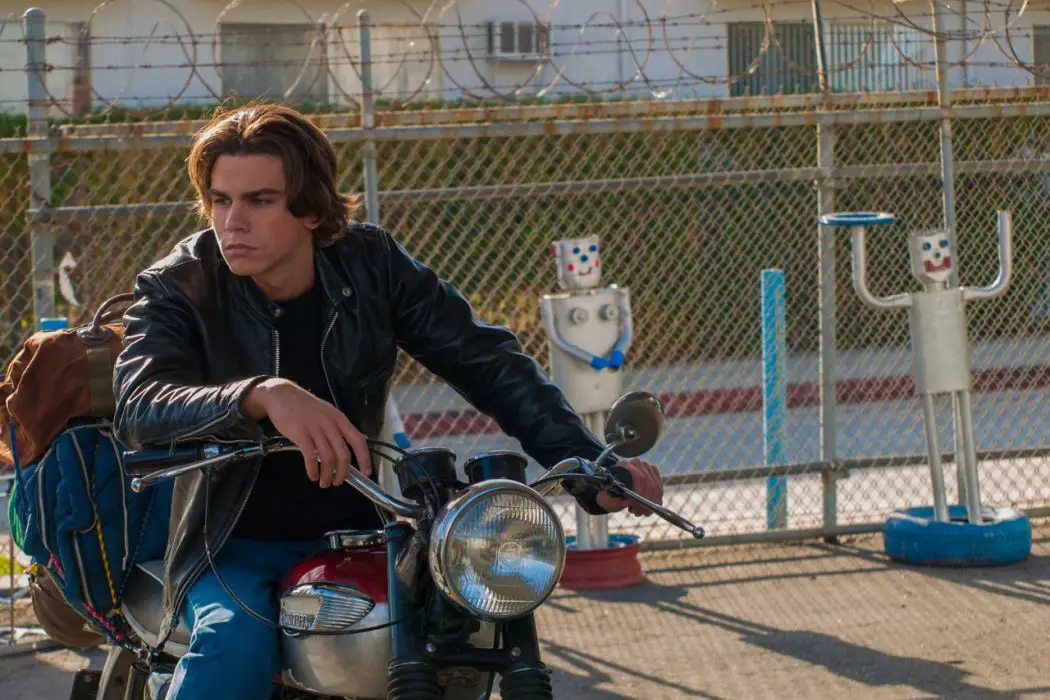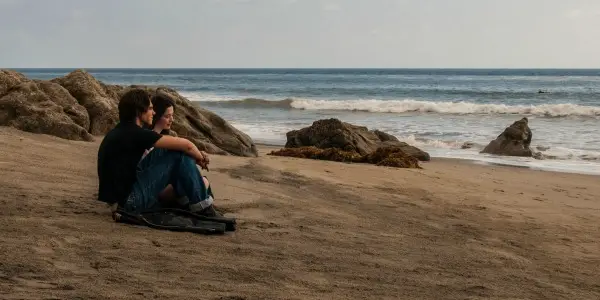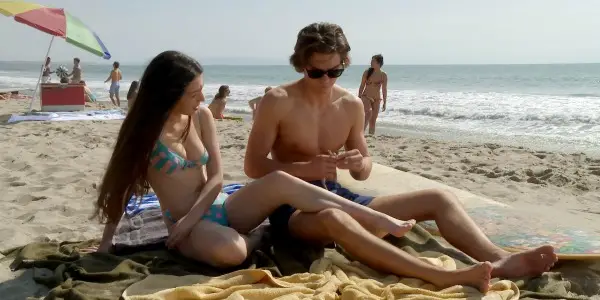LIZA, LIZA, SKIES ARE GREY: Inoffensive, Inert, Inconsequential

It took me a while to discover the wonderful world…
The day I watched Liza, Liza, Skies Are Grey, a British real estate company issued a press release. It was a map showing the best places to buy a house in order to avoid a nuclear holocaust. It was a widely condemned publicity stunt, but depressingly symptomatic of how heightened tensions on the global stage have become.
Yes, the ever-heating dialogue between Donald Trump and Kim Jong-un has gotten pretty damn scary. Events have been developing so quickly, it seems foolhardy to guess what the world will look like next week, never mind next year. According to some reports, it seems the threat of a nuclear war is as high as it’s been since the Cold War, when it was a part of everyday existence.
And it’s in the Cold War, (1966 to be precise), where we meet Liza and Brett, the teenage protagonists of Liza, Liza, Skies Are Grey. They have been dealing with the looming nuclear threat their whole lives, and their world has been inexorably shaped by it. But they’re still teenagers, and despite all the uncertainty and danger that surrounds them, they are determined to get on with the important business of first love, and all that entails.
Liza, Liza, Skies Are Grey
Liza (Mikey Madison), is a fifteen year old cellist, with a recently passed father and an icily distant mother. The light of her life is her boyfriend, Brett (Sean H. Scully), who is one year her senior. His brother has just died in Vietnam, and he is about to move in with his father on the east coast.
With her troubled home life, and the threat of the draft in his not too distant future, the two stressed-out teens decide to take a summer road trip through their home state of California. No matter how far they go, trouble has a way of finding them, but they’re determined to have fun nonetheless.

No Budget
The first thing you notice about Liza, Liza, Skies Are Grey, is how cheap it looks. It doesn’t even look like a movie; with its too-bright lighting and basic sets, it more closely resembles a soap opera.
I wasn’t familiar with the work of writer/director Terry Sanders, but after watching a few minutes of the shoestring budgeted film, I’d come to the conclusion that he was just starting out, and on his debut feature. In actuality, he is eighty-five, and has produced two Oscar-winning documentaries, Maya Lin: A Strong Clear Vision, and A Time Out Of War. Though he is more experienced in the field of non-fiction film than narrative, he can hardly be described as an ingénue in the industry.
Now, I in no way mean to disparage micro-budget films; to raise any money at all to transform an idea into an actual motion picture is nothing short of miraculous. And so many have made fantastic looking films with miniscule financial backing. Following, was made for £15,000 (approx. $19,400), and looks sleek and stylish. The Blair Witch Project, Brick, Once, PI; there’s almost infinite examples of canny filmmakers using creativity and ingenuity to disguise their barely-there-budgets.
But Sanders doesn’t manage this, he doesn’t get close. Every scene smacks you in the face with its cheapness. It gets so bad at points that it really takes you out of the story. There aren’t enough extras populating this sixties California, and so the world looks bizarrely empty. None of the beaches Liza and Brett visit have more than a handful of visitors. The roads are strangely quiet. Though most of the locations used in the film are exteriors, the lack of extras still makes them seem artificial.

The biggest victim of the lack of funding are the attempts at rooting the film in the sixties. There’s usually only one period marker in any given scene, like a vintage cereal packet or radio. The clothes the characters wear aren’t anachronistic, but neither are they noticeably of-the-time; if this film was on a muted TV, and you turned on half way through, it could conceivably be fifteen minutes until you realised it wasn’t set in the present day. The music is burdened too heavily with establishing the period. Every time a new song pipes up it’s like Sanders is yelling “Hey, look! It’s the sixties! Honest!”
Unfortunately, it’s not just in the film’s aesthetic where Sanders proves inept at setting time and place, but also in the design of his characters.
Cold War Kids
As the opening title card states, 1966 was a period of extreme upheaval. Even setting aside the spectre of nuclear war, there was Vietnam, battles over civil rights, and the sexual revolution for the populace to contend with. The teenage years are hard for everyone; but to come of age during this time must have been a formidable challenge.
Our teenage heroes, Liza and Brett, are played sweetly by Mikey Madison and Sean H. Scully. They aren’t the most skilled actors, but this is one of the few instances in Liza, Liza, Skies Are Grey where the film’s detriments actually work to its advantage. These are teenagers after all, and they are not known for their confidence or eloquence; Liza and Brett’s goofy awkwardness around each other is about the only authentic element of the whole movie.
The two young actors are not helped by Sanders‘ uninspiring script. Neither of their characters are written with enough dimension; there’s not enough there to make either seem like a complex human being. Liza, at least, gets a difficult family life to pad her character out, but that disappears as a factor for almost an entire hour in the middle of the film. Brett gets nothing but a dead brother and some vague notion of a future with his father on the east coast.

Sanders has eschewed characterisation, in favour of using his young stars as vessels to run through all the greatest hits of the sixties. The ongoing discussion between Liza and Brett about if and when they should have sex is only there as an opportunity to tackle the sexual revolution. Brett’s discussions about his vague future and his brother’s past are only there as a way to talk about the draft. In the third act, when an African-American lady helps scare off the bullies that have been attacking Brett, Liza asks her name. The film is so heavy-handed that I honestly would not have been surprised if she’d answered “Coretta Scott King.”
None of the events in Liza, Liza, Skies Are Grey happen organically. With such empty main characters, they just can’t. Whether it’s the sleazy motel owner that they run into, or the gang of youths that pick a fight with Brett for no reason, there’s nothing here that feels at all considered. Sanders fills his film with so many happenings, that it wouldn’t be right to accuse it of being boring. But empty and dissatisfying? Absolutely.
In Conclusion
Liza, Liza, Skies Are Grey is not a hard film to watch. The young leads aren’t the greatest actors, but they are endearing, and they have chemistry. Sanders has populated his movie with enough events that there’s not enough time for the viewer to get bored.
That doesn’t mean it deserves your time or attention. The lack of budget is distractingly obvious, and stops the film ever becoming truly engaging. The leads are given only sporadic characterisation, and purely function as ways for Sanders to tick off his list of the big themes of the nineteen-sixties.
As a coming-of-age tale, it’s inoffensive, as a reminiscence of the Cold War years, it’s inert, as a whole it’s completely inconsequential.
What are the best films you’ve seen that deal with growing up during the Cold War? How does Liza, Liza, Skies Are Grey compare?
Liza, Liza, Skies Are Grey is released in the US on August 18th. For all future release dates, click here.
Does content like this matter to you?
Become a Member and support film journalism. Unlock access to all of Film Inquiry`s great articles. Join a community of like-minded readers who are passionate about cinema - get access to our private members Network, give back to independent filmmakers, and more.
It took me a while to discover the wonderful world of cinema, but once I did, everything just fell into place.












